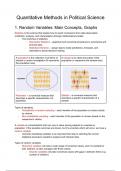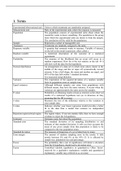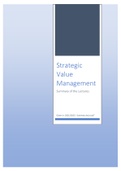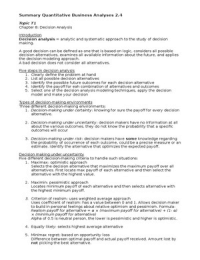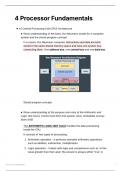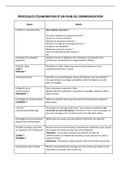INTERNATIONAL SECURITY
Inhoud
WEEK 1: COLLEGE 1........................................................................................................... 2
WEEK 1: COLLEGE 2........................................................................................................... 6
WEEK 2: COLLEGE 3- FOREIGN MILITARY INTERVENTIONS........................................ 13
WEEK 2: COLLEGE 4- GASTCOLLEGE ............................................................................ 20
WEEK 3: LECTURE 5- COUNTERTERRORISM AND MILITARY TECHNOLOGY ............. 27
WEEK 3: COLLEGE 6- BIO THREATS AND BIODEFENSE (David Stiefel) ........................ 34
WEEK 4: COLLEGE 7- INSURGENCY AND COUNTERINSURGENCY ............................. 37
WEEK 4: COLLEGE 8- GLOBAL SECURITY ..................................................................... 41
WEEK 5: COLLEGE 9- PEACEBUILDING AND ITS CRITICS ............................................ 46
WEEK 5: COLLEGE 10- MIGRATION ................................................................................ 52
WEEK 6: COLLEGE 11- GENDER DIMENSIONS OF PEACE AND SECURITY ................ 59
WEEK 6: COLLEGE 12- CLIMATE CHANGE AND HUMAN SECURITY ............................ 64
WEEK 7: COLLEGE 13- RESPONSIE ................................................................................ 70
,WEEK 1: COLLEGE 1
- International security: avoidance of international conflict
- Secure survival of a nation state through military
Guiding questions:
1. What is (international/global) security?
2. Whose security are we talking about?
3. What counts as a security issue?
4. How can security be achieved? → what is our response
What is international security?
1. security, in an objective sense, measures the absence of threats to acquired values,
in a subjective sense, that absence of fear that such values will be attacked.
→ some see values as mere survival (smaller sense) , other see values as a
dignified life (broader sense)
2. security studies may be defined as the study of the threat, use and control of military
force
3. ‘Security’ means the absence of threats. Emancipation is the freeing of people (..)
from those physical and human constraints which stop them from carrying out what
they would freely choose to do. (..)
- security and emancipation are the two sides of the same coin. Emancipation,
not power or order produces true security
4. security is a ‘powerful political tool in claiming attention for priority items in the
competition for government attention
The contested concept of security
- Which values need protection?
- What counts as a threat to these values?
- Is security absolute? (can such thing as absolute security even exist)
- “An essentially contested concept’(Barry Buzan) that creates ‘disputes about its
proper use’’ - Walter Gallie
- “survival” (freedom from life-determining threats) vs. “survival-plus” (freedom to have
life choices)?
- missing
Whose security?
- the referent object
● What needs to be secured?
● state, national interests
● individual, ethnic group, society as a whole, the environment, the planet
● not dependent of each other
,What counts as a security issue?
- PEW research center results from Pring 2020 survey on major threats → climate
change and infectious diseases are the top
- the past shapes the kind of threats we are afraid of → knowing the threat, you could
almost guess where the participant comes from
How issues and threats have changed
- traditionally, preference given to external rather than internal threats
→ but end of Cold War and globalization questioned the preference for external
threats
- traditionally, focus on extreme threats and measures
→ but diversity of approaches in security studies criticized realist approach of the
study of security
- types of security threats (Buzan, 1991)
● military offensive/defensive
● political stability of states
● economic resources and welfare
● sustainable of societal traditions and customs
● maintenance of the local and planetary biosphere
How can security be achieved?
- no state was fully prepared for the global pandemic
‘The search for perfect security.. defeats its own ends.
Playing for safety is the most dangerous way to live.’-
Leviathan
- there is always a trade-of
- always compromise between certain values
, Key points
- what is security?
→ an ‘essentially contested concept’- it’s political
- whose security?
→ state, the individual, the ethnic group, society as a whole, the environment,
the planet
- What counts as a security issue?
→ military, economic, political, societal, and environmental threats
- How to achieve security?
→ more or less security, never complete security: marked by tradeoffs
Security studies as a field of study
- the ‘golden age’1950-1960
● the two world wars
1. Civilian contribution to security strategy
2. long-term strategy to avoid war
● the national interest
1. security rather than welfare
● nuclear revolution
1. research of deterrence, containment, coercion, escalation, arms
control
2. belief in deductive, rational thinking
‘in IR scholarship, a policy of deterrence generally refers to threats of military retaliation
directed by the leaders of one country to the leaders of another in an attempt to present the
other country from resorting to the threat of use of military force in pursuit of its foreign policy
goals’
- very rational view
‘nuclear war spurred theorizing because it was inherently more theoretical than empirical:
none had ever occurred’ - Richard Betts, 1997
- the end of the ‘golden age’1960-1970
● limits to traditional approaches
1. not applicable to peasant war in Vietnam
2. limited view in politics
Inhoud
WEEK 1: COLLEGE 1........................................................................................................... 2
WEEK 1: COLLEGE 2........................................................................................................... 6
WEEK 2: COLLEGE 3- FOREIGN MILITARY INTERVENTIONS........................................ 13
WEEK 2: COLLEGE 4- GASTCOLLEGE ............................................................................ 20
WEEK 3: LECTURE 5- COUNTERTERRORISM AND MILITARY TECHNOLOGY ............. 27
WEEK 3: COLLEGE 6- BIO THREATS AND BIODEFENSE (David Stiefel) ........................ 34
WEEK 4: COLLEGE 7- INSURGENCY AND COUNTERINSURGENCY ............................. 37
WEEK 4: COLLEGE 8- GLOBAL SECURITY ..................................................................... 41
WEEK 5: COLLEGE 9- PEACEBUILDING AND ITS CRITICS ............................................ 46
WEEK 5: COLLEGE 10- MIGRATION ................................................................................ 52
WEEK 6: COLLEGE 11- GENDER DIMENSIONS OF PEACE AND SECURITY ................ 59
WEEK 6: COLLEGE 12- CLIMATE CHANGE AND HUMAN SECURITY ............................ 64
WEEK 7: COLLEGE 13- RESPONSIE ................................................................................ 70
,WEEK 1: COLLEGE 1
- International security: avoidance of international conflict
- Secure survival of a nation state through military
Guiding questions:
1. What is (international/global) security?
2. Whose security are we talking about?
3. What counts as a security issue?
4. How can security be achieved? → what is our response
What is international security?
1. security, in an objective sense, measures the absence of threats to acquired values,
in a subjective sense, that absence of fear that such values will be attacked.
→ some see values as mere survival (smaller sense) , other see values as a
dignified life (broader sense)
2. security studies may be defined as the study of the threat, use and control of military
force
3. ‘Security’ means the absence of threats. Emancipation is the freeing of people (..)
from those physical and human constraints which stop them from carrying out what
they would freely choose to do. (..)
- security and emancipation are the two sides of the same coin. Emancipation,
not power or order produces true security
4. security is a ‘powerful political tool in claiming attention for priority items in the
competition for government attention
The contested concept of security
- Which values need protection?
- What counts as a threat to these values?
- Is security absolute? (can such thing as absolute security even exist)
- “An essentially contested concept’(Barry Buzan) that creates ‘disputes about its
proper use’’ - Walter Gallie
- “survival” (freedom from life-determining threats) vs. “survival-plus” (freedom to have
life choices)?
- missing
Whose security?
- the referent object
● What needs to be secured?
● state, national interests
● individual, ethnic group, society as a whole, the environment, the planet
● not dependent of each other
,What counts as a security issue?
- PEW research center results from Pring 2020 survey on major threats → climate
change and infectious diseases are the top
- the past shapes the kind of threats we are afraid of → knowing the threat, you could
almost guess where the participant comes from
How issues and threats have changed
- traditionally, preference given to external rather than internal threats
→ but end of Cold War and globalization questioned the preference for external
threats
- traditionally, focus on extreme threats and measures
→ but diversity of approaches in security studies criticized realist approach of the
study of security
- types of security threats (Buzan, 1991)
● military offensive/defensive
● political stability of states
● economic resources and welfare
● sustainable of societal traditions and customs
● maintenance of the local and planetary biosphere
How can security be achieved?
- no state was fully prepared for the global pandemic
‘The search for perfect security.. defeats its own ends.
Playing for safety is the most dangerous way to live.’-
Leviathan
- there is always a trade-of
- always compromise between certain values
, Key points
- what is security?
→ an ‘essentially contested concept’- it’s political
- whose security?
→ state, the individual, the ethnic group, society as a whole, the environment,
the planet
- What counts as a security issue?
→ military, economic, political, societal, and environmental threats
- How to achieve security?
→ more or less security, never complete security: marked by tradeoffs
Security studies as a field of study
- the ‘golden age’1950-1960
● the two world wars
1. Civilian contribution to security strategy
2. long-term strategy to avoid war
● the national interest
1. security rather than welfare
● nuclear revolution
1. research of deterrence, containment, coercion, escalation, arms
control
2. belief in deductive, rational thinking
‘in IR scholarship, a policy of deterrence generally refers to threats of military retaliation
directed by the leaders of one country to the leaders of another in an attempt to present the
other country from resorting to the threat of use of military force in pursuit of its foreign policy
goals’
- very rational view
‘nuclear war spurred theorizing because it was inherently more theoretical than empirical:
none had ever occurred’ - Richard Betts, 1997
- the end of the ‘golden age’1960-1970
● limits to traditional approaches
1. not applicable to peasant war in Vietnam
2. limited view in politics




